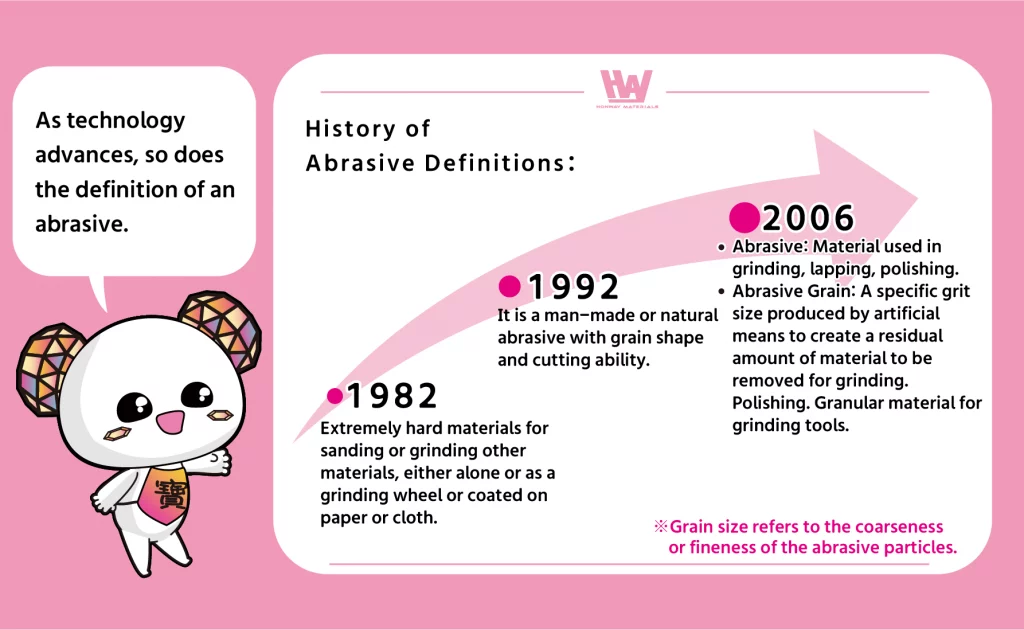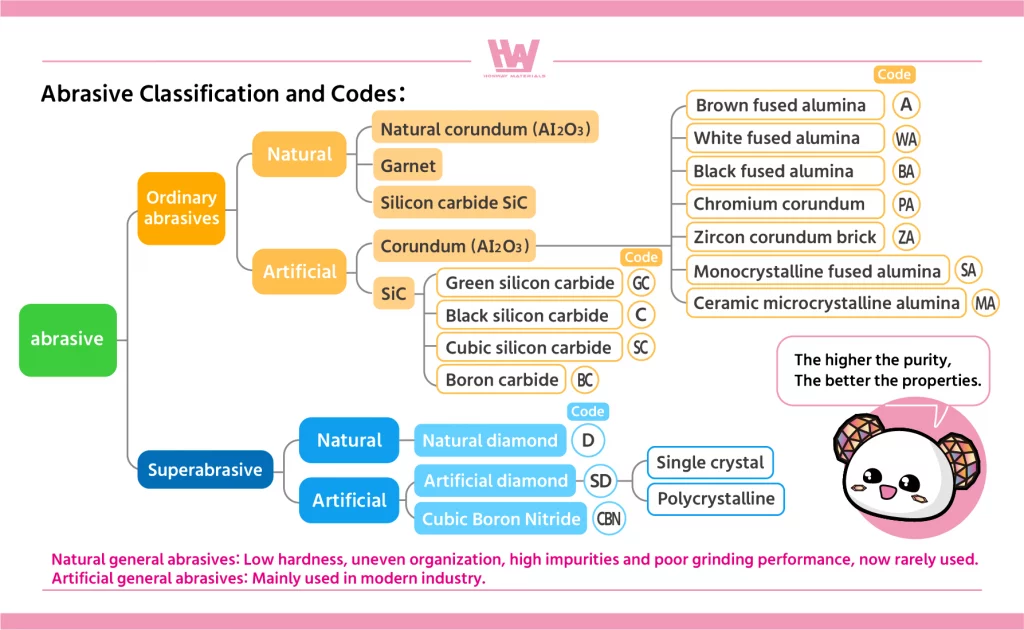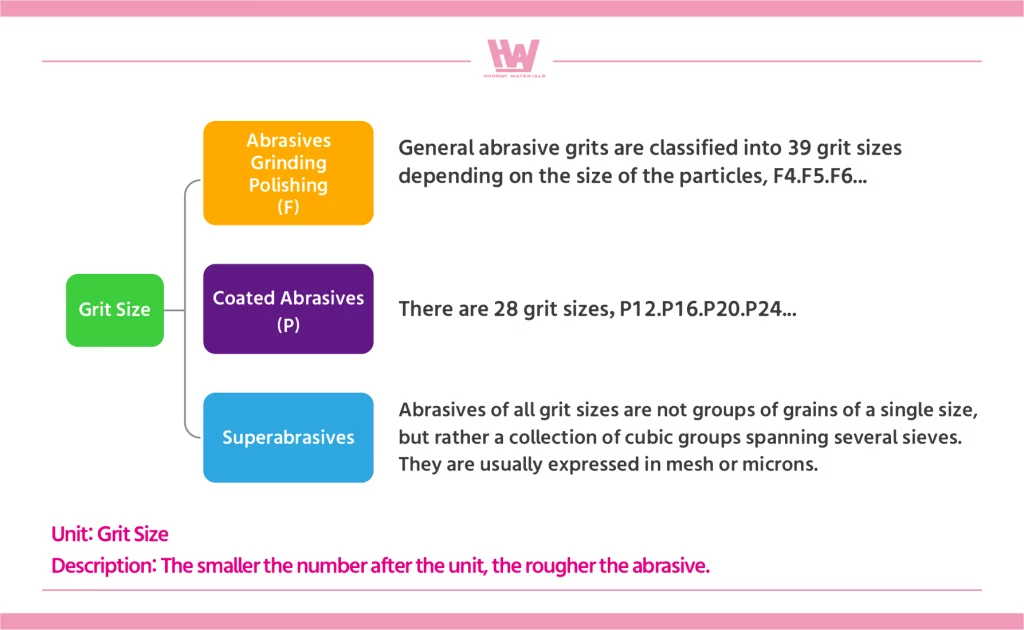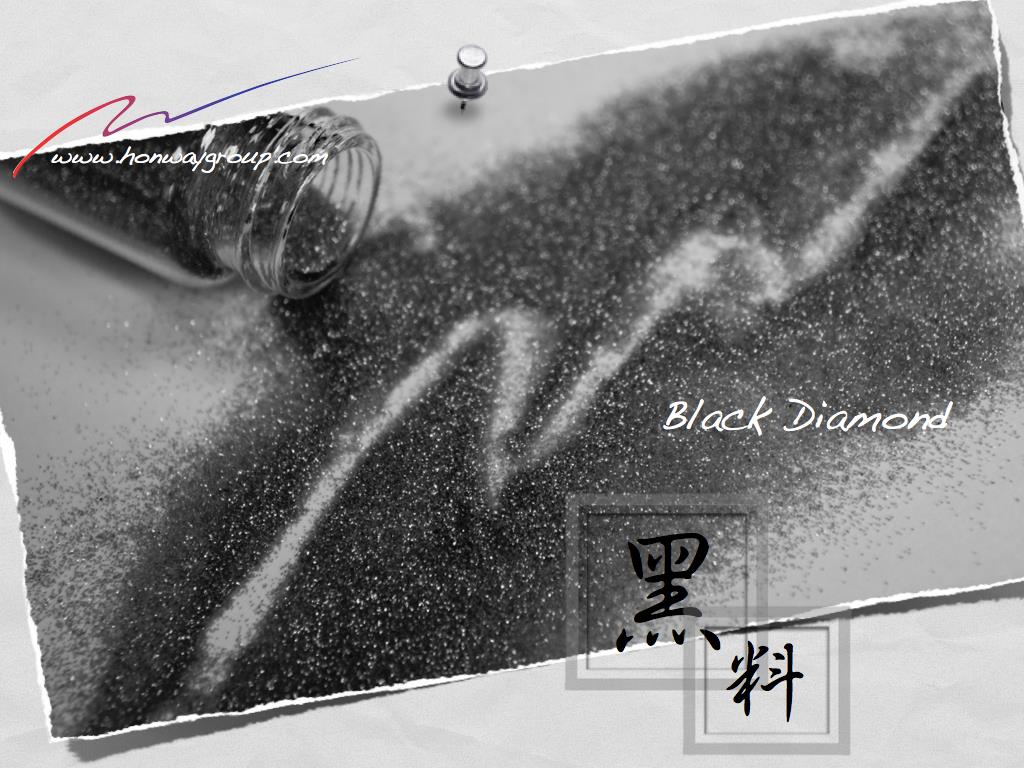Abrasives are materials used in grinding and polishing processes. Their primary function is to remove irregularities, roughness, or damage from material surfaces through friction and abrasion. Abrasives are commonly used in metalworking, woodworking, stone processing, and various other industrial applications. Here is an overview of abrasives:
Table of Contents
Definition

1982: Abrasives were defined as materials with extremely high hardness, used for grinding or polishing other materials. They could be used independently or formed into grinding wheels or coated on paper or cloth.
1992: The definition expanded to include both natural and synthetic materials with granular shapes and cutting capabilities
2006: Abrasives were further defined as materials that play a role in grinding, polishing, and abrading. These materials are artificially made into specific grain sizes and are used to manufacture grinding, polishing, and abrasive tools. These abrasive grains can directly perform grinding or polishing in their free state.
Classification and Codes

- Natural Common Abrasives: Historically, these were used more frequently. However, due to their lower hardness, uneven structure, and high impurity content, which result in poor grinding performance, they are now rarely used.
- Artificial Common Abrasives: These are primarily used in modern industry.
Basic Performance Requirements
The main raw materials for making abrasive tools can be directly used for grinding and polishing.
Abrasive tools are able to grind the main material of work pieces.
These abrasives should possess basic characteristics such as hardness, toughness, strength, thermal stability, chemical stability, and manufacturability.
-
- High Hardness: The hardness of the abrasive must be higher than the hardness of the workpiece.
- Toughness: The ability to resist breaking under pressure or impact. Adequate toughness ensures that the micro-edges of the abrasive particles can perform cutting actions, and when dulled, they can create new cutting micro-edges.
- Chemical Composition: The chemical composition of the abrasive reflects its quality and performance. The higher the purity, the better the properties. Aluminum oxide abrasives, for example, are categorized based on the content of aluminum oxide and impurities.
- Thermal Stability (Strength): The abrasive must maintain its necessary physical and mechanical properties even at high temperatures, as the grinding zone temperature usually ranges from 400 to 1000°C.
- Thermal Stability (Chemical Stability): The abrasive should be chemically stable, resistant to adhesion or diffusion reactions that could cause clogging or dulling of the tool.
- Grain Processing Capability: The abrasive grains should be uniform, with a regular shape.
- Mechanical Strength: Due to the repeated grinding forces, impact loads, and high grinding temperatures, the abrasive must have sufficient mechanical strength to withstand these effects.
- High Grit Size: Abrasives should have a high grit size for effective material removal.
Grain Size
The coarseness or fineness of abrasive particles is indicated by grain size, which is represented by grit size numbers.

F Grit Size Specifications
This grain size of abrasives for bonded tools, grinding, and polishing varies based on particle size.
Common abrasives are classified into 39 grit sizes, with a screening ratio of 1.1892.
F4~F220: Coarse grains with particle sizes above 63μm, often produced by screening methods.
F230~F1200: Micro-powder with particle sizes below 63μm, commonly produced by water selection methods.
Specifications: F4, F5, F6, F7, F8, F10, F12, F14, F16, F20, F22, F24, F30, F36, F40, F46, F54, F60, F70, F80, F90, F100, F120, F150, F180, F220, F230, F240, F280, F320, F360, F400, F500, F600, F800, F1000, F1200, F1500, F2000.
※ Although technological advances have made some of these classifications less applicable today, they still serve as a general guideline.
P Grit Size Specifications
These specifications include 28 grit sizes used for coated abrasives like sandpaper and grinding wheels.
P12~P220: Coarser grains with a screening ratio of 1.892.
P240~P2500: Finer grains.
Specifications: P12, P16, P20, P24, P36, P40, P50, P60, P80, P100, P120, P150, P180, P220, P240, P280, P320, P360, P400, P500, P600, P800, P1000, P1200, P1500, P2000, P2500.
Superhard Abrasive Grit Size
The screening ratio is 1.18.
Grain size composition: The grain size composition indicates that abrasives are not single-sized particle groups limited to the gap between two adjacent sieve sizes. Instead, they are collections of several sieve groupings, typically expressed in mesh or microns.
It is usually expressed in meshes or microns. Different particle sizes are suitable for different processing techniques and precision requirements, and the particles of each particle size abrasive can be divided into five grain groups, namely the coarsest grain, coarse grain, basic grain, mixed grain and fine grain.
- Coarse Grits: 10 to 60 mesh, suitable for rough grinding and heavy-duty cutting.
- Medium Grits: 60 to 180 mesh, used for medium-precision processing, such as metalworking and ceramic polishing.
- Fine Grits: 180 to 600 mesh, for fine grinding and polishing, commonly used in glass, stone, and semiconductor fields.
- Superfine Grits: Above 600 mesh, especially 1200 mesh and higher, suitable for ultra-precision processing, such as optical component polishing and nanomaterial handling.
Chemical Composition Properties of Common Abrasives:
The chemical composition reflects the quality and performance of the abrasive.
Higher content of the main components within the prescribed quality standards, and higher purity, result in better abrasive properties.
After reading the content, if you still don’t know how to select the most suitable option,
Feel free to contact us and we will have specialist available to answer your questions.
If you need customized quotations, you’re also welcome to contact us.
Customer Service Hours: Monday to Friday 09:00~18:00 (GMT+8)
Phone: +8867 223 1058
If you have any topics you want to learn more about or if you find it difficult to explain over the phone, feel free to message us on Facebook~
Honway Facebook: https://www.facebook.com/honwaygroup

